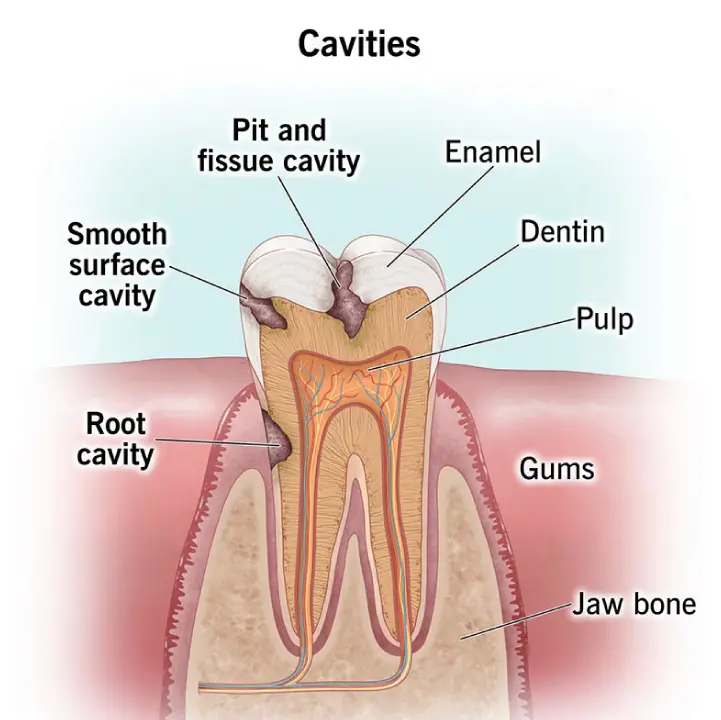
Cavities
What causes cavities?
The most common cause of cavities is poor dental hygiene and a high-sugar, high-starch diet. When food particles and bacteria are not removed, plaque forms on your teeth. Plaque acids gradually dissolve the tooth’s enamel, leading to cavity formation.
Dry mouth, certain medications and a genetic predisposition can also increase your risk of cavities.
Different types of cavities
Pit and fissure cavities
These are the most common type of cavities, forming on the chewing surfaces of molars and premolars. They develop in the small pits and fissures of the tooth’s surface where food particles and bacteria can easily get trapped.
Smooth surface cavities
These cavities form on the flat, smooth surfaces of the teeth in areas where bacterial plaque collects, such as between teeth, along the gum line, and in difficult-to-clean areas.They progress more slowly than pit and fissure cavities and are often easier to detect and treat in their early stages.
Root cavities
Root cavities form on the roots of the teeth. They are common in older adults or if you have gum recession. As the root surface becomes exposed, it becomes susceptible to decay, especially near the gumline.
Recurrent or secondary cavities
These cavities develop around previous dental work, such as fillings or crowns. Bacteria can find its way inside the restoration, causing decay in the remaining part of the tooth.
Erosion cavities
Unlike typical cavities caused by bacteria, erosion cavities are caused by direct chemical erosion of the tooth enamel by acidic foods, sugary drinks or stomach acids from conditions like acid reflux.
Baby bottle tooth decay (early childhood caries)
Baby bottle tooth decay (early childhood caries)
This type of cavity affects infants and young children due to prolonged exposure of sugary liquids like milk, formula or fruit juices in baby bottles or sippy cups.
How to get rid of cavities
It’s important to contact us if you are experiencing symptoms of a cavity. Your local Radix Dentistry dentist can determine the best course of treatment based on the extent of the cavity. Your dentist will remove the decayed portion of the tooth and restore your tooth with the right dental materials for you.
Some of the techniques your dentist may use include:
1. Dental fillings
Dental fillings are a common treatment option for cavities. Your Radix Dentistry dentist will remove the decayed portion of the tooth and fill it with a durable, natural-looking material, such as composite resin. Once your tooth is filled, its shape, function and strength will be restored.
2. Dental crowns
If the cavity has significantly damaged your tooth, you may need a dental crown. A crown is a custom-made cap that covers the entire visible portion of the tooth. It protects, restores strength and improves your tooth’s appearance.
3. Root canal therapy
When tooth decay reaches the innermost layer, known as the dental pulp, it can cause severe pain and infection. You’ll require root canal therapy to remove the infected pulp, clean the root canal and seal it. The procedure will relieve any pain you may be experiencing, and your Radix Dentistry dentist will discuss the best options to restore and protect your tooth from further damage.
How to get prevent cavities
A thorough oral care routine is the best way to prevent cavities.
Oral hygiene
Balanced diet
Fluoride treatment
Regular dental checkups
Cavity frequently asked questions?
Do cavities hurt?
Your cavity may not hurt in the beginning. However, as tooth decay progresses deeper into the layers of the tooth, you may begin to experience toothaches and sensitivity.
Can I get a cavity between my teeth?
Yes, you can get cavities between your teeth. They are known as “interproximal cavities” or “interdental cavities and occur when food gets caught in between your teeth and you don’t floss regularly.
Can I prevent cavities if I have braces?
Yes, you can prevent cavities even if you have braces. Maintaining good oral hygiene is even more crucial when you have braces, as they create additional spaces for food particles and plaque to accumulate, increasing the risk of cavities and other dental issues.
Are cavities contagious?
No, you cannot catch a cavity from someone else. Cavities are caused by a combination of factors, primarily the presence of certain bacteria in the mouth, a diet high in sugars and carbohydrates, poor oral hygiene and genetic predisposition.
Can my tooth paste and mouthwash help prevent cavities?
Yes, there are toothpaste and mouthwash products specifically designed to help prevent cavities. Ask your Radix Dentistry dentist which products they recommend.
Discover more for your smile
Our Doctors’ Affiliations




Our Leander Location
10960 E Crystal Falls Pkwy Building 1, Suite 150
Leander, TX 78641


